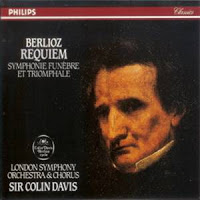Berlioz, who was a non-believer, was nonetheless so moved by the text of the Catholic Requiem that he jumped at the chance to compose a setting for it. Berlioz being Berlioz, the Grande Messe des Morts is sui generis: there really is nothing else like it in the history of music.
I have listened to well over half the recordings ever made of the Requiem, and I have seen it performed twice: the performance conducted by Sir Colin Davis at St Paul’s in London, in July of 2001, stands as one of the two or three greatest experiences of my life.
Recordings of the Requiem used to be quite rare. Understandably so; since a performance requires huge forces, including a choir numbering in the hundreds, and four extra brass choirs positioned separately from the rest of the orchestra. When Colin Davis recorded his benchmark performance, in 1969, there were few other disks in the catalog—Munch, Abravenel, Bernstein, Ormandy. All of them (except the Ormandy) clocked in at well over 80 minutes (Davis’s is close to 90 minutes). Now, I notice that conductors are speeding up the Requiem. Ozawa’s Boston reading and Spano’s Atlanta performance both fit easily onto one CD (and I hope that tempos weren’t chosen with the intention of squeezing onto a single disk). More recent excellent performances by McCreesh and Nelson offer more reasonable tempos that breathe as the music demands. For my money, the Offertorium gives one more musical magic per unit time than any other music I’ve ever heard, and the range of interpretations is very broad with regards to tempo: Ozawa is well under eight minutes, while Davis’s last recording runs well over 11 minutes. McCreesh and Nelson in their recent recordings strike a good balance around 10 minutes.

